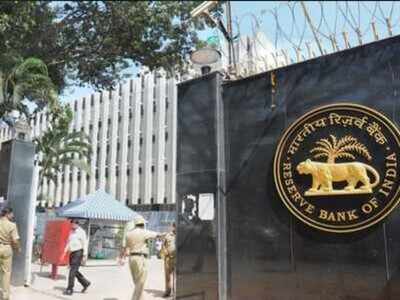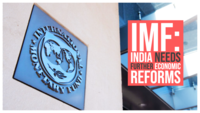
MUMBAI: The Reserve Bank of India (RBI) has warned that bad loans in banks could rise to a 20-year high as a result of the economic crisis triggered by the Covid-19 pandemic. According to the central bank, bad loans could rise from 8.5% in March 2020 to 12.5% by March 2021 under its baseline scenario, and 14.7% if the stress is severe.
In its financial stability report, the RBI hinted at a restructuring of stressed loans going forward. The central bank pointed out that globally governments and regulators have taken steps to reduce the cost of loan modifications/ restructuring to help borrowers affected by the pandemic.
These initiatives also obviate the requirement of additional capital against increased risk. “The BCBS (Basel Committee on Banking Supervision) has endorsed these strategies as long as supervisors make sure that banks use them prudently and due disclosures are made to enable market participants to assess the rationale and potential impact of such actions by the banks,” the RBI said.
The pandemic is expected to reverse all gains made by banks in cleaning their books. According to RBI data, bad loans steadily declined from 11.5% in March 2018 to 9.3% (2019) and 8.5% in March 2020. The clean-up has resulted in banks using a large chunk of capital.
This has resulting in the capital adequacy ratio edging down to 14.8% in March 2020 from 15% a year ago. The central bank’s forecast is based on stress tests that it conducts. Among business segments, the highest percentage of loans that are under moratorium belong to MSMEs (65%), followed by individuals (55%) and corporates (42%).
“The financial system in India remains sound. Nonetheless, in the current environment, the need for financial intermediaries to proactively augment capital and improve their resilience has acquired top priority. In the evolving milieu, while risk management has to be prudent, extreme risk aversion would have adverse outcomes for all,” RBI governor Shaktikanta Das said in a foreword to the report.
In the report, the RBI said that the pandemic has the potential to amplify financial vulnerabilities, including corporate and household debt burdens in case of severe economic contraction. On the positive side, the fiscal, monetary and regulatory intervention has ensured normal functioning of markets. It also ensured the markets did not freeze despite risk aversion.
In its financial stability report, the RBI hinted at a restructuring of stressed loans going forward. The central bank pointed out that globally governments and regulators have taken steps to reduce the cost of loan modifications/ restructuring to help borrowers affected by the pandemic.
These initiatives also obviate the requirement of additional capital against increased risk. “The BCBS (Basel Committee on Banking Supervision) has endorsed these strategies as long as supervisors make sure that banks use them prudently and due disclosures are made to enable market participants to assess the rationale and potential impact of such actions by the banks,” the RBI said.
The pandemic is expected to reverse all gains made by banks in cleaning their books. According to RBI data, bad loans steadily declined from 11.5% in March 2018 to 9.3% (2019) and 8.5% in March 2020. The clean-up has resulted in banks using a large chunk of capital.
This has resulting in the capital adequacy ratio edging down to 14.8% in March 2020 from 15% a year ago. The central bank’s forecast is based on stress tests that it conducts. Among business segments, the highest percentage of loans that are under moratorium belong to MSMEs (65%), followed by individuals (55%) and corporates (42%).
“The financial system in India remains sound. Nonetheless, in the current environment, the need for financial intermediaries to proactively augment capital and improve their resilience has acquired top priority. In the evolving milieu, while risk management has to be prudent, extreme risk aversion would have adverse outcomes for all,” RBI governor Shaktikanta Das said in a foreword to the report.
In the report, the RBI said that the pandemic has the potential to amplify financial vulnerabilities, including corporate and household debt burdens in case of severe economic contraction. On the positive side, the fiscal, monetary and regulatory intervention has ensured normal functioning of markets. It also ensured the markets did not freeze despite risk aversion.
Download
The Times of India News App for Latest Business News
more from times of india business
Quick Links
ELSS Mutual Funds BenefitsIncome Tax Refund statusWhat is AssochamITR Filing Last DateHome Loan EMI TipsHome Loan Repayment TipsPradhan Mantri Awas YojanaTop UP Loan FeaturesIncrease Home Loan EligibilityHome Loan on PFTax Saving Fixed DepositLink Aadhaar with ITRAtal Pension YojanaNita AmbaniIndian EconomyRBIAadhaar CardSBIReliance CommunicationsMukesh AmbaniIndian Bank Ifsc codeIDBI Ifsc codeIndusind ifsc codeYes Bank Ifsc CodeVijay Bank Ifsc codeSyndicate bank Ifsc CodePNB Ifsc codeOBC Ifsc codeKarur vysya bank ifscIOB Ifsc codeICICI Ifsc codeHDFC Bank ifsc codeCanara Bank Ifsc codeBank of baroda ifscBank of America IFSC CodeBOM IFSC CodeAndhra Bank IFSC CodeAxis Bank Ifsc CodeSBI IFSC CodeGST
Get the app








